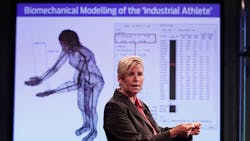Diversity of Thought is the Key to Global Competitiveness
The recent passing of Father Ted Hesburgh, former president of my alma mater University of Notre Dame, got me thinking about his trailblazing wisdom on inclusion as a vehicle for driving progress and competitiveness.
Father Ted was visionary in admitting women to Notre Dame in the 1970s based on his belief that the university could never be great if 50% of the world’s thinkers were excluded. And today, Notre Dame is one of the most prestigious institutions in the country, with almost twice the percentage of female engineers of any university in the country.
It is simple, yet genius. Get a diverse cross section of the population together and you will achieve greater innovation and overall success.
According to a recent article by Sheryl Sandberg and Adam Grant, “If men want to make their work teams successful, one of the best steps they can take is to bring on more women.”
But in manufacturing, women are underrepresented.
“Women represent manufacturing’s largest pool of untapped talent,” says the Manufacturing Institute study, "Untapped Resource: How Manufacturers Can Attract, Retain, and Advance Talented Women." While women make up approximately 50% of the labor force, the number of women in the manufacturing labor force is only 24%, according to the Manufacturing Institute.
That’s why in recent years, the Manufacturing Institute has worked to address this deficit by launching programs like the Science, Technology, Engineering and Production (STEP) Ahead program. The program highlights the role of women in the manufacturing industry through recognition, research and leadership. It also offers best practices for how manufacturers can attract, support, retain and advance women.
At USG, we are actively recruiting and promoting women to take on manufacturing roles, as well as positions in the fields of science, technology, engineering and mathematics (STEM). We know that these jobs are incubators for innovation, which help us stay competitive and promote future growth in our business.
But for USG it goes beyond recruitment. We also work hard to mentor our employees, reward them, and encourage them to grow in their careers.
Ann Franzen is USG’s first female plant manager and the managing sponsor for USG’s “Women in Manufacturing” (WiM), our employee resource group developed to support female employees.
Ann first joined USG in 1994. “I’ve had some great bosses who have encouraged me to push myself and take on new opportunities,” she says. “But it was challenging to be the only woman in my role and not have female peers to turn to for guidance. That’s part of why I’m so passionate about our WiM group.”
Through recruitment efforts, mentoring opportunities, training and peer networking, WiM works to support female employees and develop them to become future leaders. For example, the group provides each new female engineer with a welcome packet and assigns them a mentor, like 35-year USG veteran Marsha Skinner.
Marsha was a driving force in the creation of our popular Fiberock® product, and today leads the operation that last year produced a record amount of product at the lowest manufacturing cost since start-up more than 15 years ago.
“It has been a challenging experience, and one in which the team has had to overcome many obstacles.” Marsha said. “But I have enjoyed working with a diverse group of employees to solve problems and deliver a one-of-a-kind operation for the company.”
We also employ a number of women who are successful sales and marketing leaders around the world – in places like Uruguay, Mexico, Singapore, Korea, and Lebanon along with the U.S. and Canada. This is important because many of our customers in Asia and South America are family-run businesses, with wives and daughters in charge of sales, marketing and finance.
Ultimately, when we bring different people together, we have better engagement and innovation, which helps us stay competitive in today’s global economy. This helps us meet and exceed our customers’ expectations and our business objectives, and it’s the right thing to do.
Father Ted understood decades ago that women make up half of the potential human capital available in any economy, and the efficient use of this talent pool is a key driver for continued competitiveness. We should all follow his lead, and I’m proud to say that at USG, we are.
Jennifer F. Scanlon is senior vice president and president, International, of USG Corp., a manufacturer of construction materials.
